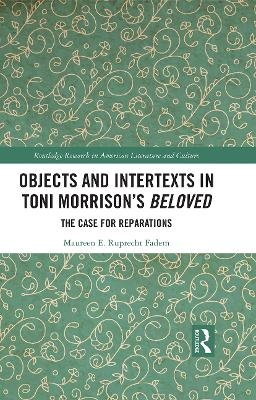
Objects and Intertexts in Toni Morrison’s "Beloved"
Routledge (Verlag)
978-0-367-41619-5 (ISBN)
Objects and Intertexts in Toni Morrison’s “Beloved”: The Case for Reparations is an inspired contribution to the scholarship on one of the most influential American novels and novelists. The author positions this contemporary classic as a meditation on historical justice and re-comprehends it as both a formal tragedy— a generic translation of fiction and tragedy or a “novel-tragedy” (Kliger)—and a novel of objects. Its many things—literary, conceptual, linguistic— are viewed as vessels carrying the (hi)story and the political concerns. From this, a third conclusion is drawn: Fadem argues for a view of Beloved as a case for reparations. That status is founded on two outstanding object lessons: the character of Beloved as embodiment of the subject-object relations defining the slave state and the grammatical object “weather” in the sentence “The rest is…” on the novel’s final page. This intertextual reference places Beloved in a comparative link with Hamlet and Oresteia. Fadem’s research is meticulous in engaging the full spectrum of tragedy theory, much critical theory, and a full swathe of scholarship on the novel. Few critics take up the matter of reparations, still fewer the politics of genre, craft, and form. This scholar posits Morrison’s tragedy as constituting a searing critique of modernity, as composed through meaningful intertextualities and as crafted by profound “thingly” objects (Brown). Altogether, Fadem has divined a fascinating singular treatment of Beloved exploring the connections between form and craft together with critical historical and political implications. The book argues, finally, that this novel’s first concern is justice, and its chief aim to serve as a clarion call for material— and not merely symbolic—reparations.
This book is freely available to read at https://taylorandfrancis.com/socialjustice/?c=language-literature-arts#
Maureen E. Ruprecht Fadem completed her Ph.D. in English at The Graduate Center of CUNY. She is Associate Professor of English at CUNY/Kingsborough and Affiliate Professor of Arts and Letters in Drew University’s Caspersen School of Graduate Studies. Maureen’s research is on Anglophone writing of the late twentieth and twenty-first centuries with specializations in Irish, Asian, and African American literatures. Her research fields include Irish studies, Partition studies, and Postcolonial Studies; within those areas she looks at questions of reparations, of literary poetics, and of race, gender, and class. Maureen’s first book, The Literature of Northern Ireland: Spectral Borderlands appeared from Palgrave in 2015. In 2019, a second book-length study titled Silence and Articulacy in the Poetry of Medbh McGuckian was brought out by Rowman & Littlefield. In late 2020, Routledge, Inc. will bring out Maureen’s co-edited collection, in which she has two chapters, The Economics of Empire: Genealogies of Capital and the Colonial Encounter. Recent articles include "A Consciousness of Streets: Reflections on the Origin and Spread of Partition" (Synthesis, 2016) and "Drawing the Border, Queering the Nation: Nation Trouble in Breakfast on Pluto and The Crying Game" (Gender Forum, 2016). In 2021, Maureen will commence new research for a three-volume comparative study of modes of realism in the contemporary literatures of partition and for a second edited collection called Imperial Debt, Postcolonial Reparations. She lives in Brooklyn.
Acknowledgments xiii
Foreword: Too Many, Too Quiet, Too Long;
or, “Anything is better than the silence” xvii
1 Remembering Is Not Forgetting; or, History Is in the
Texts of It [The Form of Beloved] 1
2 Tragedy and Its Props; or, History Is in the Things
of It [The Craft of Beloved] 33
3 Literary Memory and the Amnesiac Nation; or,
“The rest is weather” [Object Lesson, I] 73
4 Bodies [sic] Matter; or, “Certainly no clamor for a
kiss” [Object Lesson, II] 110
5 The Powers of Intertextuality, the Specter of
Reparations; or, Three Tragedies and a Critique of
the American Slave State [The Object of Beloved] 151
Afterword: First Things, Lost Things; or,
The Purloined Name and the Necessity of
(Postcolonial) Failure 188
Coda: Impossible Things; or, “I’ve had enough of
shitty news” 202
Bibliography 231
Index 243
| Erscheinungsdatum | 20.11.2020 |
|---|---|
| Reihe/Serie | Routledge Research in American Literature and Culture |
| Verlagsort | London |
| Sprache | englisch |
| Maße | 152 x 229 mm |
| Gewicht | 453 g |
| Themenwelt | Geisteswissenschaften ► Sprach- / Literaturwissenschaft ► Anglistik / Amerikanistik |
| Geisteswissenschaften ► Sprach- / Literaturwissenschaft ► Literaturwissenschaft | |
| Recht / Steuern ► EU / Internationales Recht | |
| Recht / Steuern ► Strafrecht ► Kriminologie | |
| Recht / Steuern ► Strafrecht ► Strafverfahrensrecht | |
| Sozialwissenschaften | |
| ISBN-10 | 0-367-41619-0 / 0367416190 |
| ISBN-13 | 978-0-367-41619-5 / 9780367416195 |
| Zustand | Neuware |
| Haben Sie eine Frage zum Produkt? |
aus dem Bereich


